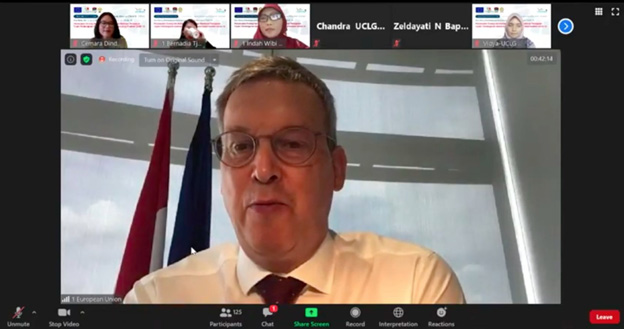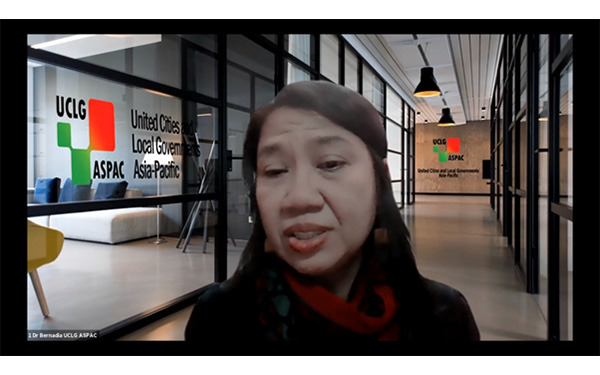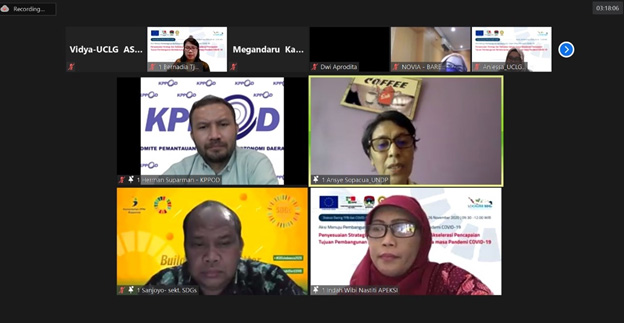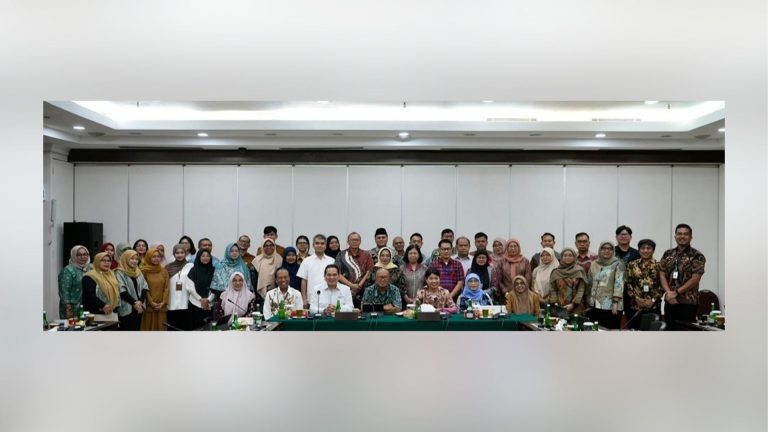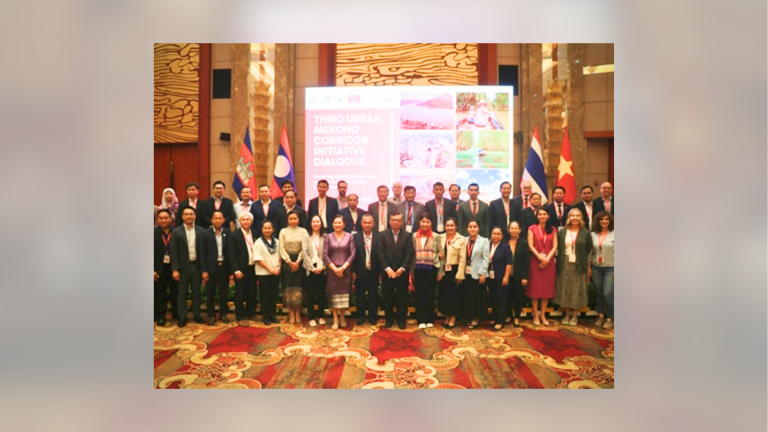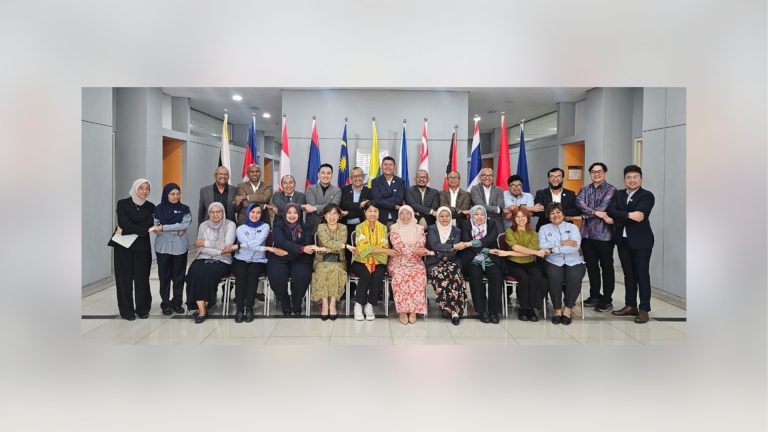26 November 2020 | WITH 10 years to go, the path to achieving 17 Sustainable Development Goals (SDGs) now comes with a set of challenges as the COVID-19 pandemic has affected many sectors, with the most significant impact being on the health and the economy sectors. In the end, this requires strategy adjustments and changes in terms of implementing development programmes all around the world.
In the case of Indonesia, UCLG ASPAC LOCALISE SDGs team, a collaborative programme with Association of Indonesia Municipalities (APEKSI) and funding support from the European Union (EU), recorded how government of Indonesia has issued a series of adjustment policies in the implementation of priorities, such as in development and budget allocations. Anticipatory steps continue to be taken to mitigate the impact of COVID-19 on a number of SDGs targets. For example, vulnerable groups are experiencing a decrease in income which in turn affects poverty rate; disruption of food logistics occur due to physical and social distancing regulations (PSBB), access to food logistics are declining because of the Termination of Employment (PHK), and health sectors experience a decrease in capacity in terms of access, services, and provision of medical equipment. Furthermore, there is also a rise in the vulnerability of women and children to gender-based violence.
The important need for adjustment was discussed at the 9th Online Discussion on SDGs and COVID-19 held by the LOCALISE SDGs programme. Invited was the Ministry of National Development Planning or National Development Planning Agency (Bappenas), which is currently drafting a National Action Plan (RAN) 2020-2024 as a response to the above challenges, covering a series of actions to achieve SDGs during and post-COVID-19. Showing Indonesia’s commitment even further, the government is also currently preparing a Voluntary National Review (VNR) which will be submitted to the United Nations meeting in 2021, where local governments are actively involved.
Following Bappenas is a reveal of how the DKI Jakarta Province has been implementing SDGs, including forming a quick response team and increased national health coverage (BPJS). The online discussion also revealed research results conducted as part of the LOCALISE SDGs, particularly on budget reallocation and programme refocusing, as well as a presentation by the United Nations Development Programme (UNDP) – highlighting the importance of multi-sector collaboration because of complexity of the SDGs objectives and the development agenda. In addition to that, the vast territory of Indonesia requires enormous resources and funds, making collaboration and partnership a helpful aspect in achieving all 17 SDGs in the country.
Within the efforts of collaboration, sharing and reflecting on best practices can not only be inspiring but vital, particularly in the midst of a pandemic, so that local governments take quick and active steps in responding to the impact of COVID-19. As a local governments association, UCLG ASPAC, for instance has published a guide book featuring good practices by cities in China, South Korea, Philippines, Indonesia and other countries that feature strategies in COVID-19 handling contextual to each region and this online discussion is also an example. “During this pandemic, we (UCLG ASPAC) continue to strive in involving local governments associations in Indonesia to get through these difficult times. This is done through online discussions covering various themes that allow not only for exchanging lessons and best practices, but also encouraging cooperation with various parties,” said Dr. Bernadia Irawati Tjandradewi Secretary General of UCLG ASPAC.
During his opening remarks, Mr. Vincent Piket as the EU Ambassador to Indonesia and Brunei Darussalam also recognised how achieving SDGs and handling COVID-19 go hand-in-hand, and it’s more important than ever for all countries to keep that in mind. “The SDGs are a call-for-action by all countries to promote prosperity while protecting the planet. But the UN SDGs 2020 report shows that even before the pandemic, progress remains uneven thus the pandemic makes the achievement of SDGs even more challenging,” he said.
Nevertheless, Mr. Vincent Piket remains in high spirits when it comes to supporting Indonesia in its SDGs attainment by 2030, calling SDGs a blueprint to achieving a better and more sustainable future for all of us, considering all the global challenges such as poverty, inequality, climate and environmental degradation, as well as peace and justice. Most importantly, he highlighted that local governments are key players on achieving SDGs in Indonesia – something that EU is always ready to support. “EU has been a long supporter for Indonesia in achieving SDGs. In fact, the achievement of SDGs depends on the ability of local government to promote integrated, inclusive and sustainable development,” he said. Adding to the key involvement of local governments, “It (SDGs) needs to be implemented and fully realised at the local level as it is an agenda of the people, for the people, and by the people.”
As the country’s capital, once again Jakarta has been doing its part in tagging strategic steps of handling COVID-19 while achieving SDGs. The DKI Jakarta Provincial Government, for example is adjusting the Regional Government Budget (APBD) with emphasis on handling the impact for vulnerable groups, creation of the Jakarta Development Collaboration Network (JDCN) platform, providing social assistance stimuli and economic incentives. “However, the local government cannot possibly work alone – rather the local government should act as a collaborator involving all parties involved,” emphasised Mr. Anies Baswedan as Governor of DKI Jakarta and Co-President of UCLG ASPAC.
The bottom line is, challenges in SDGs attainment during the pandemic actually comes with opportunities, rooms for improvements and adjustments in policies for better development agendas at the local level. It also encourages local governments to innovate, and do coordination among local bureaucracies (OPD) in increasing the capacity of local governments to implement SDGs. “Local governments are pushed to innovate, move forward to reset, rethink and reset targets and together design how cities can be sustainable during these times. Many regions are also encouraged to digitise to kickstart economic recovery, such as through empowering Micro, Small, Medium Enterprises,” Dr. Bernadia concluded.
Source: Online Discussion on SDGs and COVID-19 #9 “Strategy and Policy Adjustment to Accelerate the Achievement of Sustainable Development Goals at the Local Level during the COVID-19 Pandemic”








